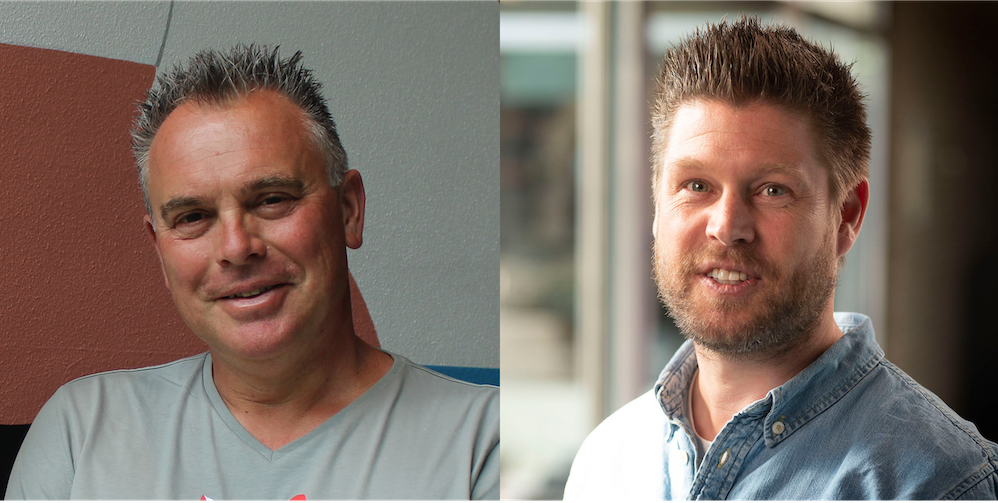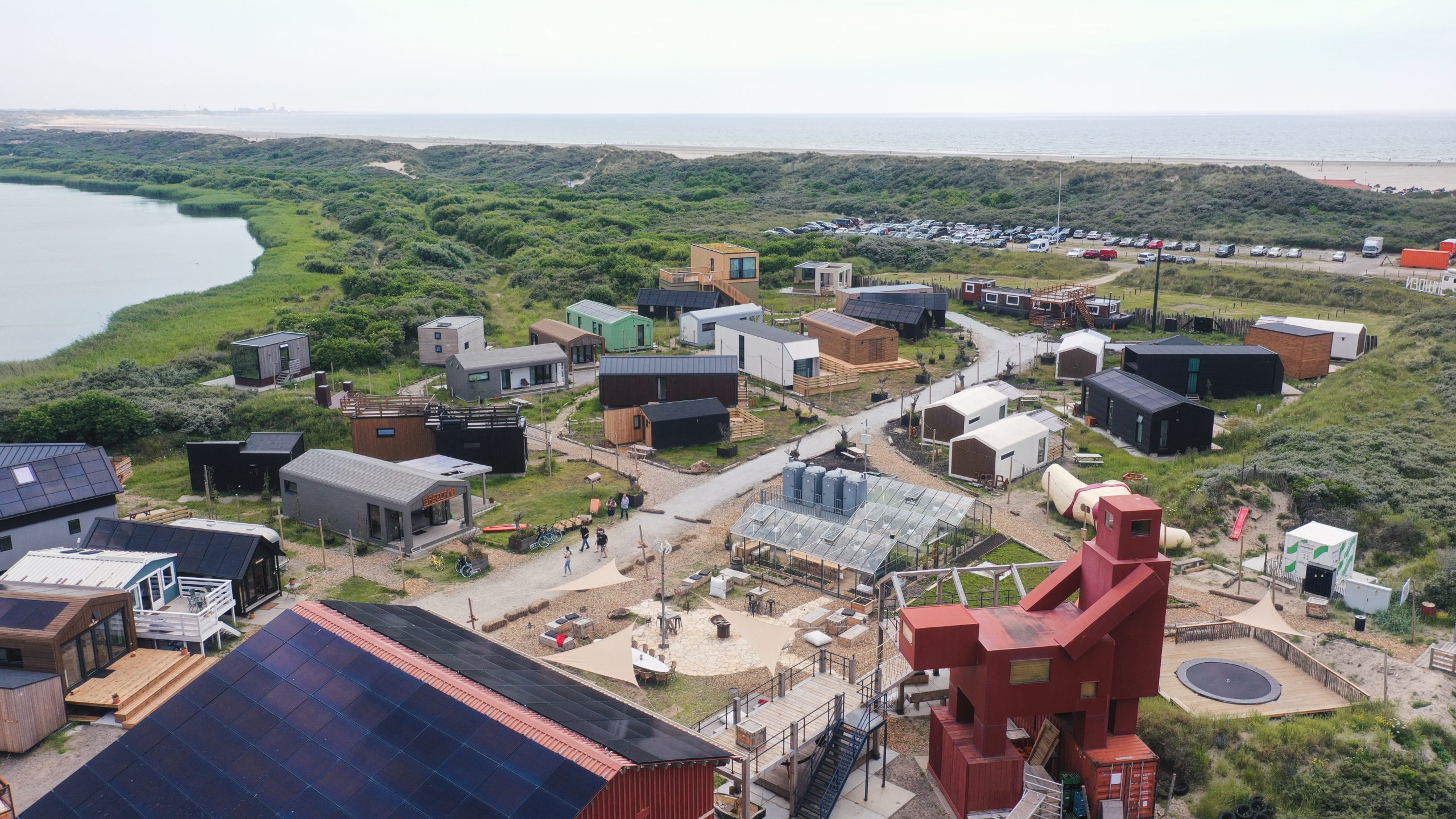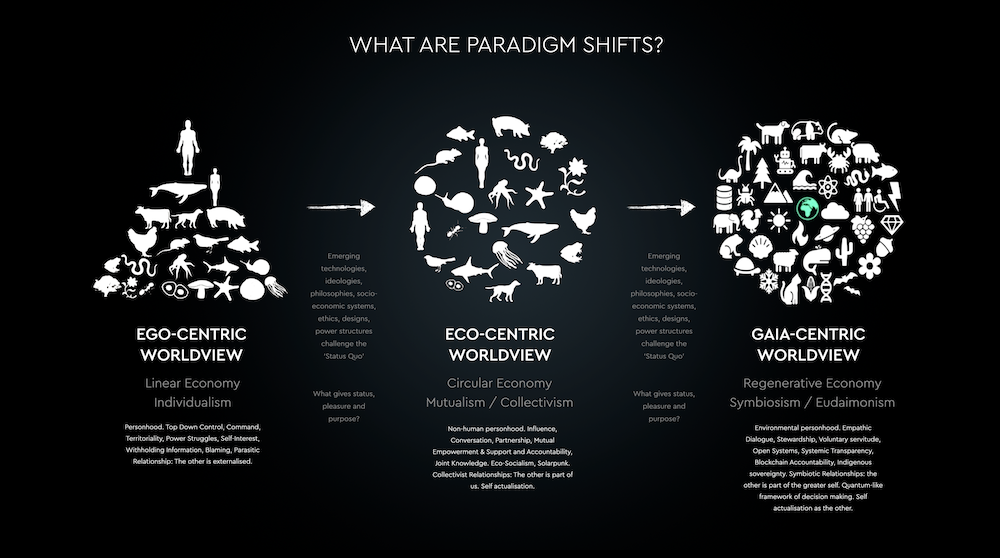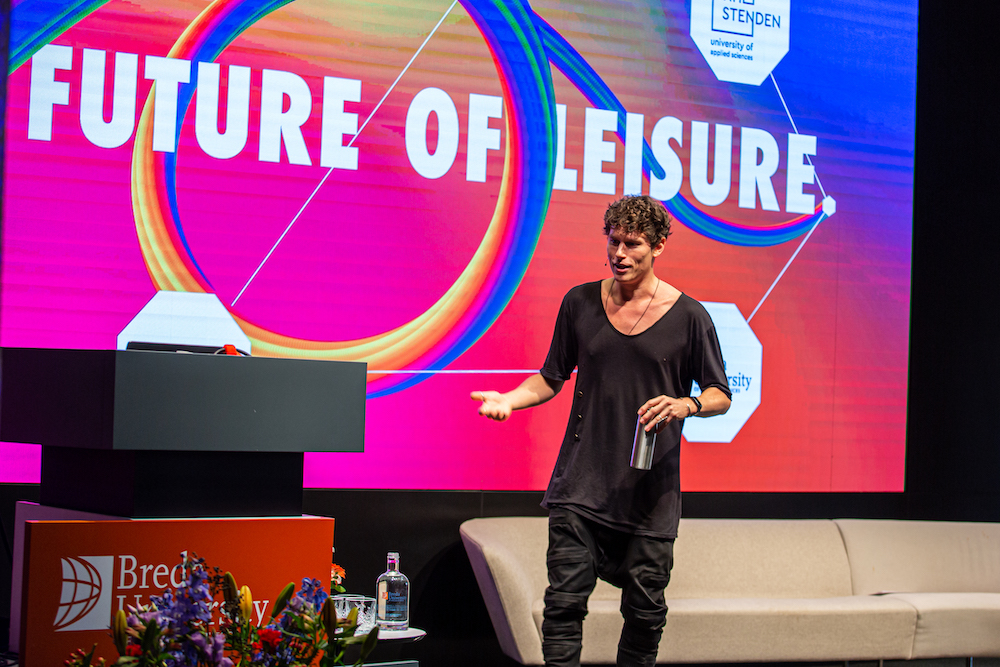The inevitable evolution from a circular to a regenerative society
We must give nature a voice

Milan Meyberg was one of the keynote speakers at the Future of Leisure conference. The Uncover editors sat down with him to discuss his experience with and vision for shaping a more sustainable and future-proof world.
Peter Horsten and Simon de Wijs are lecturers and researchers in the domain of Leisure & Events at Breda University of Applied Sciences, editors of Uncover and co-organisers the Future of Leisure conference.

We will start with some questions about you. Who are you, where do you come from and what have been some benchmarks in your development?
You know me now as a concept developer and sustainability strategist. But I have made some pretty extraordinary strides in my life’s journey so far. I studied medicine in Groningen, but after a request to perform in Bulgaria, I found that I felt much more at home in the creative music world. I became a resident DJ at Pand48 in Groningen and I decided to study at the Academy of Pop Culture, making the conscious decision to focus on music, events and festivals. Through a specialisation within my study programme, I tried to implement sustainability in all my projects and concepts. During my work placement at Studio 80 in Amsterdam, for example, where I noticed a growing need for sustainability, but also anxiety, among people.
Two years after my work placement, I returned to Groningen, where Club Paradigm announced its move to the Suiker Unie grounds. With the Paradigm Shift campaign, management gave me the space I needed to prototype new sustainability ideas. I was fascinated by the idea of implementing circularity in the construction process of a club. That idea started to take hold and I soon wondered if it would be possible to design not just a physical venue, but also a system venue such as a festival in a circular fashion. That is how I ended up at DGTL festival after Paradigm. I applied for the director position. I did not get this, but I was offered the position of Revolution Manager.
Who were actually your sources of inspiration to draw from?
During my time at DGTL I was very much inspired by people who live in an autarkical, self-sufficient manner and thus obtained a degree of freedom that is difficult to achieve in our society. We are bound by the systems we have accepted, and I wondered if that is natural. My ambition is to (someday) live autarkically and be self-sufficient, and I have already taken a few good steps towards that goal. In addition to this ambition on a personal level, at the same time I started looking at what it is like for businesses to be able to be self-sufficient and independent. I noticed that new systems and protocols simply were not there yet, and there I saw the opportunity to make a difference.
From organisations such as DGTL and Paradigm, can you give us some specific examples of things that were innovative at that time?
I was concerned with food production and healthier lifestyles and found out about the impact of our food system. With the sustainable development of the new Paradigm site, I realised that food consumption and food production play a big role in that and in 2014 I developed the ‘Symbioculture Farm’ concept. Just through the choices we make as consumers, we can already make a huge difference, individually and collectively.

People sometimes ask me what the best way is to become more sustainable. You can then recite the entire list: consume or produce sustainably, put your money in a sustainable bank, or buy organic food, no more meat, et cetera. But one of the best things you can do is to stop going to the supermarket, grow your own food and be in touch with what you eat and what you consume.
The Symbioculture Farm concept exemplifies a paradigm shift from the current linear food system to a future regenerative food system, showing the intermediate steps through various visualisations. I think that is a great example of how I am personally changing in sync with the social and business perspective.
Leisure can also serve as an excellent tool for working towards a better world. However, not everyone is quite ready, or open to it. What makes leisure or more specifically a festival (such as DGTL) suitable to promote this?
I think most people are looking for the pursuit of pleasure and the quest for happiness. Leisure satisfies those two needs and you will find them at a festival (environment). If you can show that difficult themes or systemic changes do not get in the way of those two needs, then you have a way to communicate with visitors who may not yet be ready for a new definition of leisure, or leisure as an extension of purpose. When they can get this experience in an environment where they are open to new things, realising that leisure can also have a purpose, then we are well on our way. It is precisely through the idea of festivals as a living lab that this becomes clear.
The image that many people still had of festivals ten years ago is that it was just hedonistic. That it is only about drinking, drugs and maximum enjoyment. I am glad this outdated image and narrative is changing. More and more people recognise the great social contribution festivals can make. Sustainable innovation is happening, testing new technologies and even introducing entire circular systems.
Which innovations and technologies have brought most change for you?
Aged 15, I attended my first festival and I was mostly aware of the wonderful images through the TMF and MTV television channels. During this festival, I suddenly realised; "We are actually dancing on a pile of cups and trash. Why does everyone just throw everything away like that? Why does everyone think this is normal?” This is a simple example of system failure which was really in your face, but nothing was done about it for years.
During my work for DGTL, ten years later, we managed to actually change this waste system using a resource plan, deposit cups, and a volunteer system to separate resources and quantify material flows. Just three years after the introduction of our hard cup deposit system, the City of Amsterdam made it mandatory for all festivals (with some exceptions) to use a similar system. With this commitment, the era of ‘dancing on a waste dump’ is definitely over.
One nice aspect of seeing festivals as a ‘living lab’, is that when a trial does not work, a lot is learned and then there is room for follow-up. Convincing people of the value of experimentation was a big insight that changed a lot. By enthusing stakeholders about the fact that if something succeeds, they will be the forerunners, I was able to get more and more companies join in. This is also really necessary in order to implement large-scale systemic change. For example, can you make an entire festival circular? If so, the protocols and practices could theoretically be applied to a school, a hospital, an airport or a small village. Using the analogy of festivals as living labs, you then get a shift from what used to be a hedonistic perspective to a constructive form of hedonism. Of course, everyone has to be on board to turn those systems around. After all, you will not get there by making some small tweaks here and there.
In addition, what do you really need to have in place if you want to have a completely circular festival?
First of all, a baseline measurement is required in order to know how your system is put together and what you can do. In addition, from that revolution from linear to circular, it is important not to talk about waste but about resources as raw materials. Thus, leisure can be used as an experiment to bring about improvements in society at the same time. It was not just about a hard cup system, but it was about a whole different mindset. From a waste-based mentality to a resource-based mentality. That is a revolution of the mind. My answer to the sustainability issue of ‘waste’ was not to place more bins or separate more efficiently, but to ban the word ‘waste’, and remove all ‘bins’ from the festival grounds.
Waste became a banned word and bins were removed. Something had to take their place, of course. The new forms of thinking provided new solutions and we introduced resource collection points instead of waste bins and a resource allocation plan instead of a waste plan. No cleaners but resource managers, which has a completely different connotation than ‘garbage man’. We made raw materials important. By changing the mindset, you change the relationship with stakeholders, the public and the environment.
How did you manage to change the visitors’ role in the new system?
The next revolution came in creating system transparency and in visitor engagement. We found that support from visitors was crucial to achieving our goals. To put it very simple, the visitor is someone who visits and consumes something. We therefore prefer to talk about participants (as part of a system), rather than ‘visitors’. In terms of tone of voice, we also used words such as "contribute, participate in our experiments, and provide a resource”.
For example, volunteers were posted at resource collection points thanking people for adding resources to our circular system. This provides us with an immediate opportunity to tell our story to visitors. At each interaction point, we thought about the use of communication, language and examples to help visitors make the transition inside the system. We developed a whole new interaction model with visitors. We thanked them for food scraps and recyclable compostables (thank you for the valuable resources) and within 24 hours processed them into compost to grow next year’s food from.

Participants suddenly smile as they walk away having handed in their plate of food scraps. They notice that really everything is sorted and used, even people’s urine. The entire experience is different just because the starting point is different. Festivals are great for this kind of thing because you have a few hours to get 10,000s of people used to the idea that circular systems are already a possibility.
You often talk about the transition from ego to eco to gaia. From linear to circular to regenerative. Can you take us through the essence of this development?
Often systems focus on the pursuit of pleasure and the quest for happiness. We live in a linear economy. We make things, buy them, consume them, discard them. Everything has to come with as little discomfort as possible. However, that is not sustainable and that is not how nature works. In contrast, there is no waste in nature, everything is reused, systems are complementary. There is circularity there, or if you zoom in even closer you see that there are self-reinforcing and self-healing processes, increasing levels of complexity, making systems stronger. Our bodies work in a similar way. The succession from linear to circular to regenerative is logical in that sense, even when you consider what our society should look like in the future. In short, we have created a big mess in the past. Becoming circular does not solve that mess, which makes the transition from circular to regenerative inevitable.
But how does nature respond to invasive or festering species? Can nature do this without help?
When a system is unbalanced, it can do two things: cease to exist or a find a new balance. ‘You adapt or you die’ is what you see in nature, and those are the only two options we have. Nature does this effortlessly by itself. We can and should do the same from within ourselves. We know this is inherent to nature, but our connection to systems means we do not see how we can make that transition.
When I pitched circularity at DGTL, the first thing I said was "this is an intermediate step, not an end goal”. Indeed, the final goal is to change the function of festivals so that a festival causes a regenerative effect. That it does more good than harm, and solves problems, which it used to cause. The direct step from a linear system to a regenerative system is too big. People literally cannot grasp that. The intermediate step via circularity is a necessary step to eventually move to the regenerative format.
Why did you move from festivals to Basecamp, which you describe yourself as a tiny houses eco-retreat where the future of sustainable housing and self-sufficiency is being developed?
Regenerative thinking also proved to be catching on at Basecamp. People got it. I lived there myself and tried to minimise my own environmental impact and create systems to this end. And if this happens to take place in an environment that is pleasant, encouraging, stimulating and fulfilling, people adopt the core values more easily. Again, a strong link to leisure. Perhaps leisure should become something you have to put a lot of effort into, which will make it very fulfilling. Leisure for purpose rather than leisure for pleasure.
Did you have to deal with an awful lot of regulations when you wanted to change systems?
First of all, let me say that Basecamp is a work in progress. It is not completely circular and not regenerative in all areas. Framing it as an experiment (we are going to try this, and this is where we want to get to) already creates some regulatory flexibility. Always include stakeholders in that process, though. Explain that it could be that you do not always follow the rules completely in order to get results.
Say you want to get rid of the sewer system, then there are all these rules, how do you deal with faeces, with urine, can you treat that yourself? Festivals do not have treatment plants, but back then we did put up a container which could purify urine and water, which was approved as an experiment in the festival setting. You must dare to claim room for experimentation. For example, placing wind turbines at Basecamp which may not yet have passed all inspections. But together with the government, it might be possible to study what the effect on birds is. Whether they cause noise pollution or not. How people react to it. When a part works, it is also easier to get people to join in for new parts.
Apart from the energy grid, are there any other specific examples where you have made strides with Basecamp?
Ideally, you go to a resort with a net positive impact on the environment. A place that produces more energy than it consumes. Where you pick fruits and vegetables from the garden or greenhouse, and therefore do not have to go to the supermarket. You eat honest and organic food, and you cook using magnetic induction. You participate in an activity such as a beach clean-up, or you create a piece of permaculture. All the small acts and actions you take have a positive effect on the environment and (micro)climate. Breaking it down into small pieces allows people to see that living in a circular system is already possible, and that the step to regenerative life may not be as big as people think. I believe that small communities, of 15 to 20 ‘like-minded individuals’ in a collective setting, can live regeneratively.
If we are talking about getting everyone on board then you are also talking about nature. Environmental personhood, the tree as a stakeholder at the table. Can you explain to us how it works?
Every person sees that nature is part of our systems and society, but nature has no voice and cannot give feedback. There is no method to interact with nature. But what if it were possible to personify nature, and you could ask nature how best to create systems which are sustainable, circular or regenerative?
People are able to communicate with each other and form personal connections. With nature this is impossible. For example: Suppose I sit at a table, and opposite me ‘sits’ a stone. When I would talk to the stone, asking it questions like "How can we optimise our recycling system for this area?” everyone would think "this Milan guy is nuts”. But if that stone were a person with a face, a voice and a character, visualised in a digital avatar providing geological features of a natural area, then ‘that stone’ could literally tell us what is happening under your feet. Personifying nature enables us to include nature as a stakeholder in decision-making processes and models. I think this way of thinking is a logical next step in the transition from a circular to regenerative society.
Can you talk a little more about the prototype which gives nature a voice?
With the rapid development of AI, large-language models and generative AI, the world is about to change on a scale that is unprecedented. If you look at current developments, with ChatGPT and AI such as Midjourney, we see that knowledge and creativity which was previously unattainable is now available to everyone. By combining multiple AIs, we can solve problems in a very different manner. And in this context, I started exploring whether we can have questions answered from the perspective of nature. Most of the questions we ask are anthropocentric. Our failure to solve the major climate issues over the past 50 years stems from our urge to always want to solve problems from a human perspective. However, our problems have become so large and complex that we may have to conclude that we are simply unable to solve them.
This is how I arrived at my GAIA concept, of which I already gave a small sneak preview at the conference. With a development team from different companies, we are working to create an early prototype which can be replicated for nature around the world. With the GAIA project, forests, rivers, mountains, jungles or oceans get a face, a persona and a voice. By interacting with personifications of nature, the notion arises that we are part of a larger system which is in a very intense period of transition. A transition with only two options; either the system ceases to exist (you die) or it finds a new balance (you adapt).
I am very curious to see how the first test users will react to the various ENVAI (Environmental Artificial Intelligence) models. By the way, maybe we should change the term ‘test users’. Test users are more the ‘sparring partners’ or ‘guardians’ of AI.
It is very important for us humans to realise what our role is in relation to the development of AI and nature. Western people generally have a world view in which they are ‘users’ of nature. Indigenous peoples had a very different world view, being instead ‘protectors, representatives or mediators’ of nature. Many indigenous peoples never had the delusion of being the owners of nature, or ‘possessors’ of a piece of land. I think many of our problems can be solved if we can reintroduce this indigenous world view to the West. Hopefully it will help to (be able to) bring nature to the table and have a conversation about this.




































































